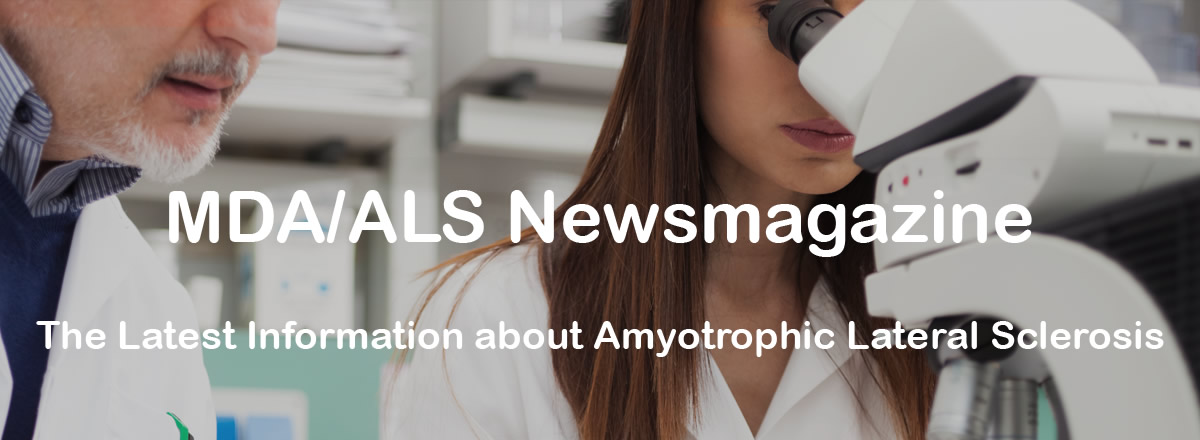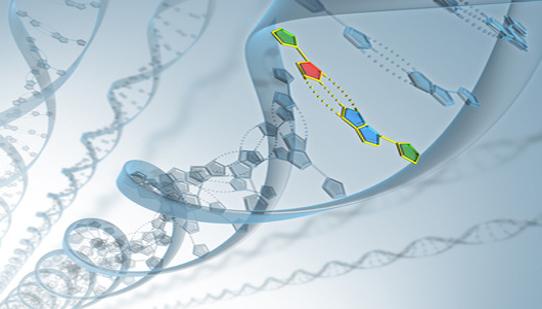
Ubiquilin 2 Abnormalities Connected to ALS

Abnormalities in the ubiquilin 2 gene can cause ALS, and accumulations of ubiquilin 2 protein — even without gene mutations — also are associated with the disease
A group of researchers led by Teepu Siddique at Northwestern University Feinberg School of Medicine in Chicago has identified abnormalities in the ubiquilin 2 gene and protein as important contributors to several forms of amyotrophic lateral sclerosis (ALS).
The new findings link physical and cognitive manifestations of some forms of ALS with mutations in the ubiquilin 2 gene and possibly with abnormal accumulations of the ubiquilin 2 protein. The ubiquilin 2 protein plays a role in a cellular maintenance mechanism called the ubiquitin-proteasome pathway, which normally disposes of damaged proteins.
"Abnormalities in the ubiquilin 2 gene or protein are not the cause of most forms of ALS," said neurologist Valerie Cwik, MDA's medical director and executive vice president-research. "But clearly ubiquilin 2 mutations can be one cause of this devastating disease.
"The finding of abnormalities in ubiquilin 2, which is involved in destruction of damaged proteins, further supports the hypothesis that insufficient degradation of faulty proteins could be a common factor in ALS.
"These new findings open up an important new investigative avenue in ALS research."
The study team, which included scientists from several institutions in the United States and Canada, published its findings online Aug. 21, 2011, in the prestigious journal Nature.
MDA did not fund this study, but several members of the team have received previous MDA research grants for the study of ALS. Siddique is a former director of the MDA/ALS Center at Northwestern and received multiple MDA research grants between 1990 and 2005. In addition, study team member and paper co-author Benjamin Brooks directs the MDA/ALS Center at Carolinas Medical Center in Charlotte, N.C.
Ubiquilin 2 gene mutations cause X-linked-dominant ALS
The vast majority — 90 to 95 percent — of ALS cases are not inherited and are considered sporadic. Five to 10 percent of ALS cases run in families, and many different genes have been implicated.
The researchers show that a number of mutations in the ubiquilin 2 gene, which is on the X chromosome, can cause an X-linked form of juvenile and adult-onset familial ALS, as well as ALS with dementia (severe cognitive impairment).
The ubiquilin 2-linked forms of ALS are inherited in an X-linked-dominant pattern, meaning both females and males can develop the disease if they inherit only one flawed gene from one parent. (Most X-linked diseases are inherited an an X-linked-recessive pattern, meaning males are predominantly affected and that females do not generally develop the disease because their second X chromosome is sufficient to protect them.)
Protein accumulations in ALS can occur without gene mutations
The study investigators show that abnormal, coil-like accumulations of the ubiquilin 2 protein can occur in the spinal cords of people with ALS without dementia and in the brains of people with ALS/dementia — whether or not there is a mutation in the ubiquilin 2 gene. These ubiquilin 2 protein accumulations appear to be associated with development of ALS, perhaps by tying up ubiquilin 2 and keeping it from its normal duties, the new findings suggest. However, a causative connection between ubiquilin 2 protein accumulations and ALS has not yet been proven.
This phenomenon bears similarities to other recent ALS findings. Mutations in the genes for the TDP43 protein and the FUS protein are known to cause familial ALS, but abnormal and possibly disease-contributing accumulations of TDP43 and FUS also occur in people with sporadic ALS, even in the absence of such mutations.
Ubiquilin 2 helps destroy abnormal proteins
Ubiquilin 2 is a member of the ubiquilin protein family, which regulates the destruction of cellular proteins that are damaged or abnormal and destined for a disposal structure known as the proteasome.
"The removal of misfolded or damaged proteins is critical for optimal cell functioning," the study's authors note in their Aug. 21 paper.
They say their findings "link abnormalities in ubiquilin 2 to defects in the protein degradation pathway, abnormal protein aggregation [accumulation], and neurodegeneration, indicating a common pathogenic mechanism that can be exploited for therapeutic intervention."
Meaning for people with ALS
These new findings should open new avenues for exploration by ALS researchers. Likely first steps are the development of cells and mice that have ubiquilin 2 mutations, so that the ubiquilin 2 pathways in health and disease can be studied and potential targets for therapies identified.
The investigators on the new study say their data "provide robust evidence for an impairment of protein turnover in the pathogenesis [causation] of ALS and ALS/dementia, and possibly in other neurodegenerative disorders as well."
Understanding protein turnover pathways, they add, "should provide novel molecular targets for the design of rational therapies for these disorders."